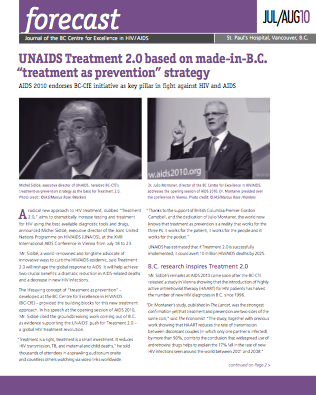UNAIDS Treatment 2.0 based on made-in-B.C. “treatment as prevention” strategy
 A radical new approach to HIV treatment, dubbed “Treatment 2.0,” aims to dramatically increase testing andtreatment for HIV using the best available diagnostic tools and drugs, announced Michel Sidibé, executive director of the Joint United Nations Programme on HIV/AIDS (UNAIDS), at the XVIII International AIDS Conference in Vienna from July 18 to 23.
A radical new approach to HIV treatment, dubbed “Treatment 2.0,” aims to dramatically increase testing andtreatment for HIV using the best available diagnostic tools and drugs, announced Michel Sidibé, executive director of the Joint United Nations Programme on HIV/AIDS (UNAIDS), at the XVIII International AIDS Conference in Vienna from July 18 to 23.
Mr. Sidibé, a world-renowned and longtime advocate of innovative ways to curb the HIV/AIDS epidemic, said Treatment 2.0 will reshape the global response to AIDS. It will help achieve two crucial benefits: a dramatic reduction in AIDS-related deaths and a decrease in new HIV infections.
The lifesaving concept of “treatment as prevention” – developed at the BC Centre for Excellence in HIV/AIDS (BC-CfE) – provided the building blocks for this new treatment approach. In his speech at the opening session of AIDS 2010, Mr. Sidibé cited the groundbreaking work coming out of B.C. as evidence supporting the UNAIDS’ push for Treatment 2.0 – a global HIV treatment revolution.
“Treatment is a right, treatment is a smart investment. It reduces HIV transmission, TB, and maternal and child deaths,” he told thousands of attendees in a sprawling auditorium onsite and countless others watching via video links worldwide.
AIDS 2010 endorses BC-CfE initiative as key pillar in fight against HIV and AIDS “Thanks to the support of British Columbia Premier Gordon Campbell, and the dedication of Julio Montaner, the world now knows that treatment as prevention is a reality that works for the three Ps: It works for the patient, it works for the people and it works for the pocket.”
UNAIDS has estimated that if Treatment 2.0 is successfully implemented, it could avert 10 million HIV/AIDS deaths by 2025.
B.C. research inspires Treatment 2.0
Mr. Sidibé’s remarks at AIDS 2010 came soon after the BC-CfE released a study in Vienna showing that the introduction of highly active antiretroviral therapy (HAART) for HIV patients has halved the number of new HIV diagnoses in B.C. since 1996.
“Dr. Montaner’s study, published in The Lancet, was the strongest confirmation yet that treatment and prevention are two sides of the same coin,” said The Economist. “The study, together with previous work showing that HAART reduces the rate of transmission between discordant couples (in which only one partner is infected) by more than 90%, points to the conclusion that widespread use of antiretroviral drugs helps to explain the 17% fall in the rate of new HIV infections seen around the world between 2001 and 2008.”
In a front-page story, Dr. Montaner, director of the BC-CfE, told The Province newspaper that July 18 was a great day for British Columbia, as the made-in-B.C. initiative put the province at the forefront of the HIV and AIDS response. “While treatment is highly cost-effective on its own merits because it is a life-saving, disease-preventing intervention, it has a multiplier effect on the prevention axis, which makes this a very attractive investment,” he said.
Dr. Montaner stated that expanding HAART coverage will have multiple benefits including decreasing tuberculosis, decreasing the number of orphans and preserving and strengthening health systems in affected countries around the world. “Universal access to care, treatment and prevention is the fundamental building block for maternal and child health. Let me say this once more, there cannot be maternal and child health without universal access,” he said.
G8 fails to fulfill universal access pledge
G8 nations promised in 2005 to fund universal access by 2010, but have not lived up to their commitment. Dr. Montaner noted that his own federal government, led by Canadian Prime Minister Stephen Harper, has failed to fully fund universal access and missed an opportunity to put the HIV strategy firmly back on track when it largely ignored universal access during recent G8 meetings in Canada.
He noted, however, that France’s First Lady, Carla Bruni-Sarkozy, has strongly supported treatment as prevention and the need to deliver on the promise of universal access. “We ask her to ensure that her husband, the president of France, becomes a forceful advocate for that position when France hosts next year’s G8 meeting,” he said.
Dr. Montaner added that governments around the world will now say they face a crisis of resources when asked for money to provide funding for universal access, but resources are not the issue. “The challenge is not finding money, but changing priorities,” Dr. Montaner noted. “When there is a Wall Street emergency or an energy crisis, billions upon billions of dollars are quickly mobilized. People’s health deserves a similar financial response and much higher priority.”
Meanwhile, high-level speakers at the conference – including former U.S. President Bill Clinton and billionaire philanthropist Bill Gates – added their thoughts on ways forward to combat HIV and AIDS.
A total of 193 countries were represented at the conference and 19,100 people participated at AIDS 2010, and all were left with a sobering reminder from Dr. Montaner as they left the conference. “As we say farewell to each other and pack our bags to leave Vienna, we must remember that another 7,000 people will become infected today, as they did yesterday and will again tomorrow,” said Dr. Montaner. “This epidemic is our life’s work. Let’s ensure that the epidemic ends, soon and forever.”
